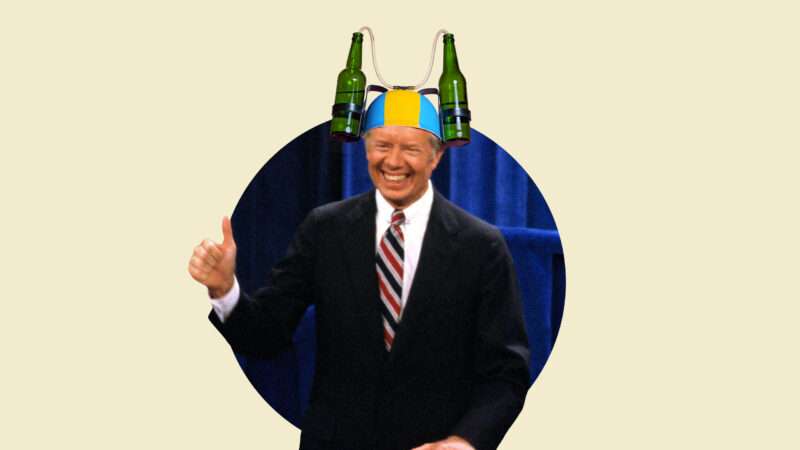
When President Jimmy Carter signed a bill legalizing homebrewing in 1978, fewer than 100 breweries were operating in the United States. Two years ago, a study of the country's beer scene found nine metropolitan areas with more than 100 active breweries.
Correlation is not causation, of course, but any history of the explosive growth of American craft beer over the past four decades should include the small but vital role that Carter played in unleashing that flood of suds—and the tremendous amount of economic growth produced by the once-stale, now-thriving American beer market. And despite a deep personal aversion to hagiographic histories of any American president, this week's news that Carter is receiving hospice care at home has me thinking about exactly how much credit the 39th president deserves for the proliferation of crisp lagers and bitter IPAs on offer at thousands of American craft breweries.
In 2010, The Atlantic declared that Carter had "saved craft beer" by signing H.R. 1377 and making it legal for Americans to brew beer in their homes. But in fact, the craft beer revolution was brewing before Carter signed the bill. It was the product of entrepreneurial financiers like Fritz Maytag, who saved San Francisco's Anchor Brewing from bankruptcy in 1965 and helped keep alive a tradition of small, independent breweries in a world increasingly dominated by mass-produced beer. It resulted from scientific breakthroughs, like the development of the Cascade hop (which would become the backbone for the revitalization of a once nearly extinct and now ubiquitous type of beer called "India Pale Ale"), which hit the market in 1972. State-level legal changes that opened the way for brewpubs—beginning with significant reform in Washington State in 1982—probably did more to create today's brewery-rich environment than any federal changes.
Still, Carter's deregulation of homebrewing was a seminal moment. By scrapping a Prohibition-era law that mainly served to limit competition in the brewing market, he gave Americans the freedom to try out a new hobby—and some of them quickly turned professional.
Sierra Nevada Brewing Company, widely recognized as one of the first true craft breweries in the country, was launched in 1980 by Ken Grossman and Paul Camusi, who started making beer at home. Jim Koch, who founded Sam Adams Brewery in 1984, similarly got his start by brewing at home. Neither of those brands would likely exist today without Carter.
Charlie Papazian, then-president of the Brewers Association, a trade group, told Reason in 2009 that roughly 90 percent of brewers started by making beer at home. The number of breweries in the country has grown tremendously since then, so that figure might be considerably lower today. Still, the pipeline from homebrewing to craft brewing was an essential step in the process.
That 1978 law didn't change the federal ban on making spirits at home—another legacy of Prohibition that persists to this day. Because of that, we can get a bit of a glimpse into the alternate reality where homebrewing wasn't deregulated.
Today, there is a growing market for craft spirits—but it lags far behind craft beer, and the major brands continue to dominate the market for hard alcohol. Without the experimentation and entrepreneurial possibilities opened by the deregulation of home brewing, it seems reasonable to assume that beer would have evolved along a similar trajectory. We'd probably have more than just Budweiser and Coors today as consumers demanded more and better choices, but the explosive growth of alternative styles and independent breweries wouldn't have materialized.
Ultimately, the heroes of the craft brewing revolution are the entrepreneurs and workers who invested time and money to make a profit, not Carter, who merely conceded that they shouldn't be imprisoned for innovating in the wrong kind of building. But he nevertheless played a vital role by getting the federal government out of the way. Without him, we'd probably have fewer choices and less fun.
The post Jimmy Carter Sparked a Craft Beer Explosion by Getting Government Out of the Way appeared first on Reason.com.







